Does Treating Baby Acne With Breast Milk Work?
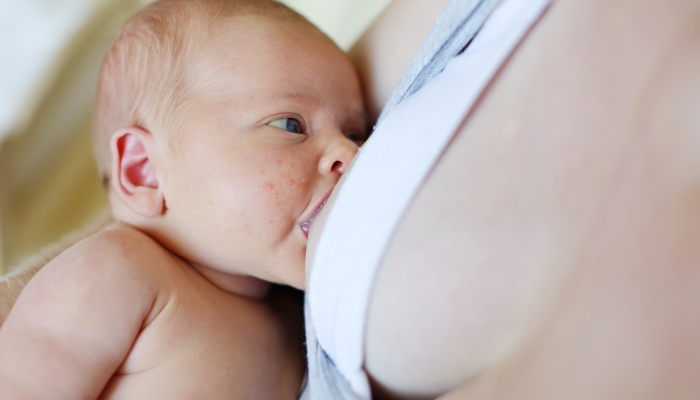
- Baby acne is fairly common, affecting about 20% of newborn babies.
- Breast milk has been used by many cultures to treat illnesses and injuries.
- Breast milk has some antibiotic properties that can fight bacteria.
- There isn’t much evidence to show that breast milk can treat baby acne, but it doesn’t hurt to try.
Many people rave about the amazing qualities that breast milk possesses. It can help newborns fight off infections and diaper rash, is mixed into bath water to keep baby’s sensitive skin soft, and can be made into lotions. But does treating baby acne with breast milk work?
Baby acne is a common condition that affects many baby’s skin. Maternal hormones are mostly to blame for these tiny white bumps that can appear in the first few weeks of your baby’s life. Most baby acne will resolve on its own without treatment, but some mothers may want to try to use natural remedies to prevent or treat an acne breakout on their newborn’s sensitive skin.
What Does Baby Acne Look Like?
Baby acne appears as tiny red bumps or tiny white bumps on your baby’s face. In older children, the skin condition can have blackheads and whiteheads, similar to adolescent acne or acne on adults’ skin.
Common Causes Of Baby Acne
Baby acne is not caused by poor hygiene or even irritated skin. Newborn’s skin breaks out in acne due to their mother’s hormones still in their system. It is believed that an overabundance of testosterone can cause infant acne. Keeping your baby’s face clean and wearing super soft clothing can help with the irritated skin, but hormones are mostly to blame.
Common Ages For Baby Acne
Acne in babies 3 months old and younger is fairly common. About 20% of babies develop newborn acne. Infantile acne can be present for up to two years, and is less common. It is more common in boys than in girls.
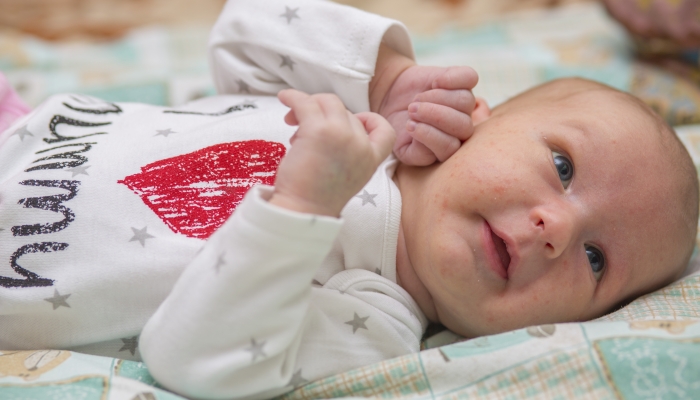
Does Treating Baby Acne With Breast Milk Work?
There has been some research into treating baby skin conditions with breastmilk. Breast milk has antibiotic and antiviral effects and can keep your baby healthy and help clear up infections. However, there is no evidence showing that breast milk can treat or prevent baby acne. This is most likely because hormones, not bacteria, cause baby acne.
How to Treat Baby Acne
Babies have very sensitive skin, and some baby acne treatments can irritate your baby’s skin or even cause an allergic reaction. It’s crucial to speak with your baby’s pediatrician before you try any over the counter medicines or herbal remedies as baby acne treatment. The best treatment for baby acne is to keep your baby’s face clean and avoid scratching or pinching any pimples.
Treating Baby Acne at Home
- Gently wash the affected area with warm water.
- Use only mild soap on your child’s skin.
- Avoid scrubbing.
- Place a few drops of breast milk or coconut oil on a cotton ball.
- Dab the moistened cotton ball over any red bumps.
- Do not pick at or pinch pimples on your baby’s face.
Prescription medications
Most newborn skin will clear up on its own within a few weeks. Your baby’s doctor may recommend prescription medications for severe cases of acne. These may include:
- Tretinoin 0.025% cream
- Adapalene 0.1% gel
- Benzoyl peroxide 2.5% cream
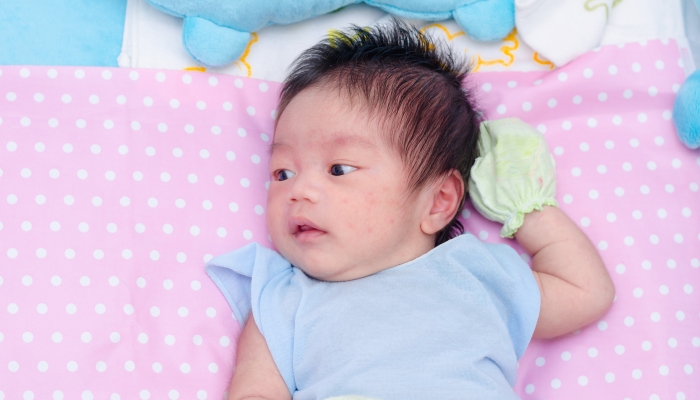
How Long Does It Take to Get Rid of Baby Acne?
There are two specific types of baby acne: neonatal acne, which happens in babies age 3 months or younger, and infantile acne, which happens in babies up to two years old. Most neonatal acne and infantile acne go away on their own, and 98% of infantile acne is completely resolved by 24 months.
When to See a Doctor for Your Baby’s Acne
Infant acne usually lasts only a few weeks. Those tiny red bumps will not normally hurt your baby or cause any lasting effects. If the acne is severe, lasts more than a few weeks, or seems to be causing your baby discomfort, schedule an appointment with your pediatrician.
The good news about baby acne is that it is usually harmless. It is unlikely that baby acne will leave scarring like other types of acne can. Baby acne is not an indicator that your child will suffer from worse acne later in life.
Other Common Skin Conditions
Because babies have very sensitive skin, you should always be on the lookout for these other common skin conditions:
Heat Rash
A heat rash is a rash of tiny pink bumps that will usually appear on your baby’s upper chest, neck, and back. Look for heat rash when your baby has been in hot, humid weather or has been in the sun. Heat rash might be itchy or give a “pins and needles” feeling. In most cases, heat rash will go away within 2 or 3 days without treatment.
Allergic Reaction
Allergic reactions can be an emergency. If your baby breaks out in sudden hives or has swelling of the lips, face, or tongue, seek medical attention right away. Other symptoms of an allergic reaction include repetitive vomiting or sudden lethargy.
Eczema
Eczema is a common skin condition that shows up as crusty, flaky patches on the skin. It usually appears on the arms or behind the knees. Breastmilk, coconut oil and olive oil can be used to soothe baby eczema.
Diaper Rash
Diaper rash is one of the most common problems with baby’s skin. Keeping the skin dry around the diaper area can be a challenge, and once a diaper rash starts, it can be difficult to manage. Diaper rash can get worse if your baby is battling any viral illnesses or diarrhea. Try to use fragrance-free wipes and diapers that will not irritate baby’s skin, and let them go without a diaper for a few hours if you can.
Cradle Cap
Cradle cap happens when your baby’s head produces too much oil. It can look like yellow crusting on your baby’s head. Cradle cap is treated by using a mild shampoo and coconut oil to loosen up and remove the dead skin cells. You can also add breastmilk to the shampoo mixture.
Contact Dermatitis
Babies might get contact dermatitis from harsh soaps or detergents. If your baby develops contact dermatitis, wash the skin off right away and apply a cool washcloth. Always wash baby’s clothes in a mild, fragrance free soap.
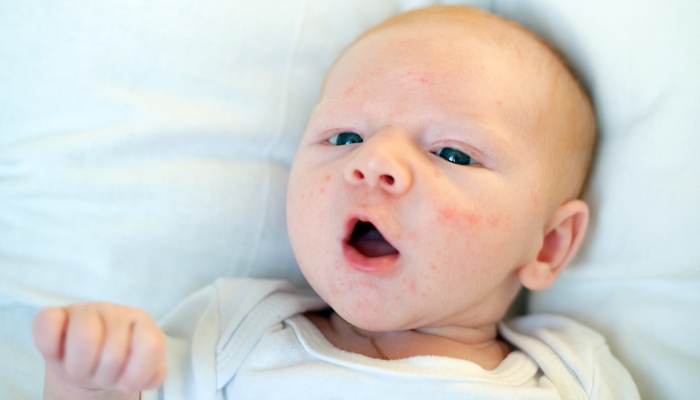
FAQs
What causes baby acne to flare up?
Baby acne is caused by maternal hormones and the baby’s own hormones. It is a common skin condition that should not cause your baby any lasting harm. Baby acne is not caused by poor hygiene or dietary choices.
Is baby acne the same as milk spots?
Baby acne is not the same as milk spots. Milk spots, or milia, are tiny white bumps that usually form near your baby’s nose. About half of all newborns have milia when they are born. Milk spots are harmless and will go away on their own. Do not pinch or pick at milia on your baby’s face.
Does a mother’s diet cause baby acne?
Mother’s diet does not cause baby acne. Baby acne is caused by hormones that come from both the mother and the baby’s own endocrine system. If your baby develops acne while you are breastfeeding, continue breastfeeding as you normally would. Hormone levels in your baby’s system will eventually lower and their skin will clear up on its own.
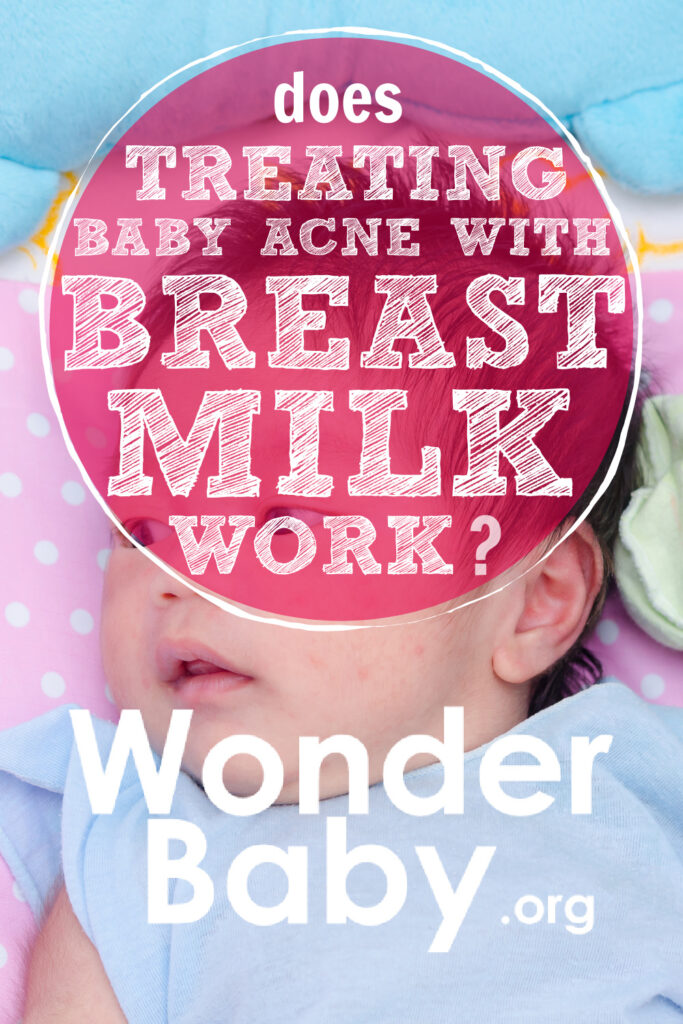
The information WonderBaby provides is not intended to be, and does not constitute, medical or other health advice or diagnosis and should not be used as such. Always consult with a qualified medical professional about your specific circumstances.
Related Posts
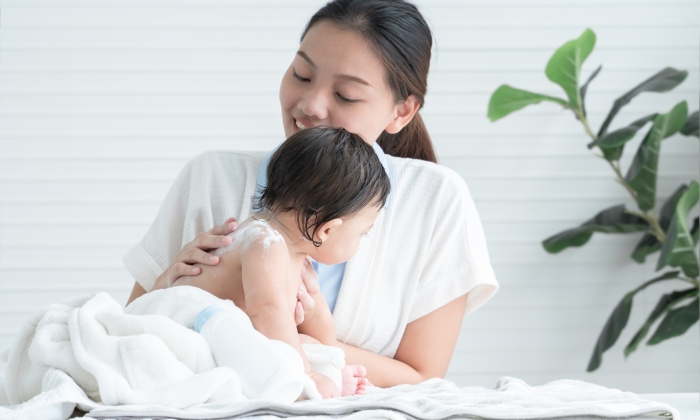
Health & Nutrition
Can Baby Skin Care Products Expire?
Is that forgotten tube of diaper rash cream still safe to use? Learn more about the expiration dates of popular skin care products for infants.

Health & Nutrition
Boosting Immunity in Kids: 3 Tips for a Healthy Winter
Parents can help boost their kids’ immunity during cold and flu season by maintaining healthy eating, sleeping, and exercising habits in the winter.
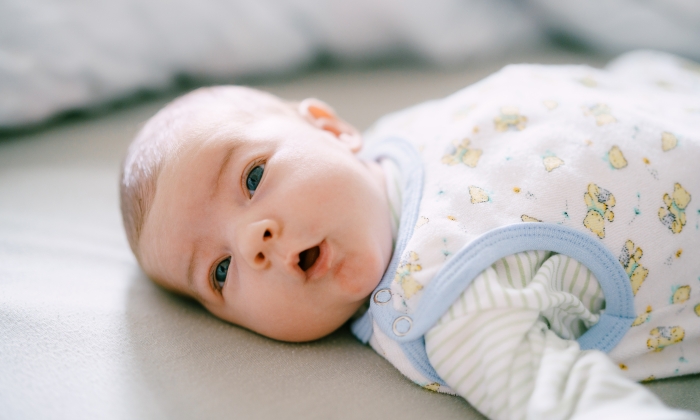
Health & Nutrition
Flat Head Syndrome and Torticollis: What You Should Know
Torticollis, or tight muscles in the neck, may cause your baby to have a flat spot on their head that needs to be assessed and treated by a physician.